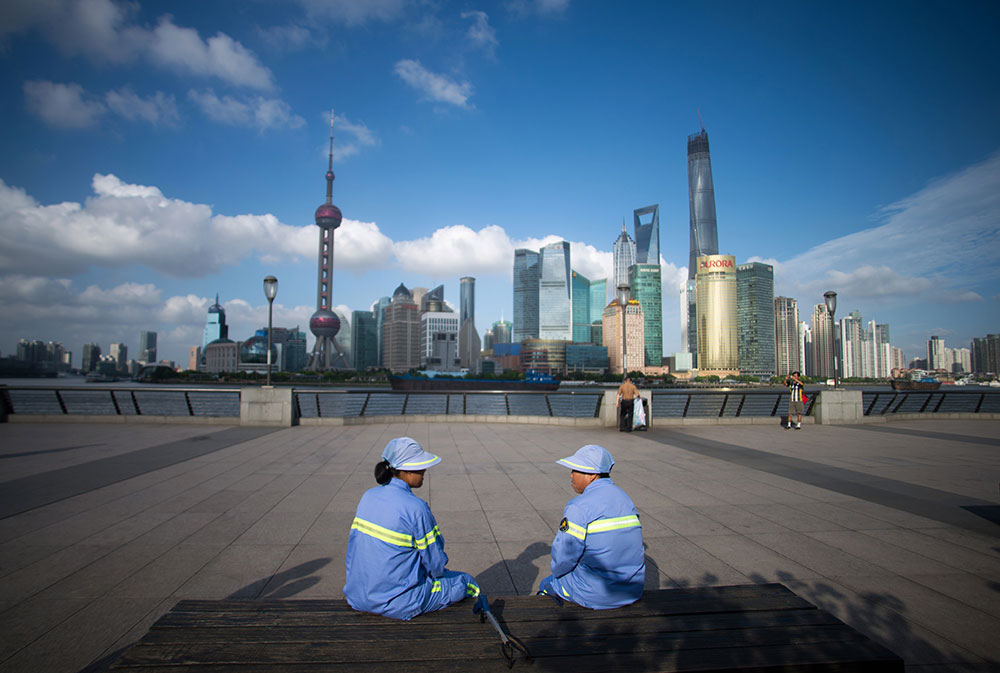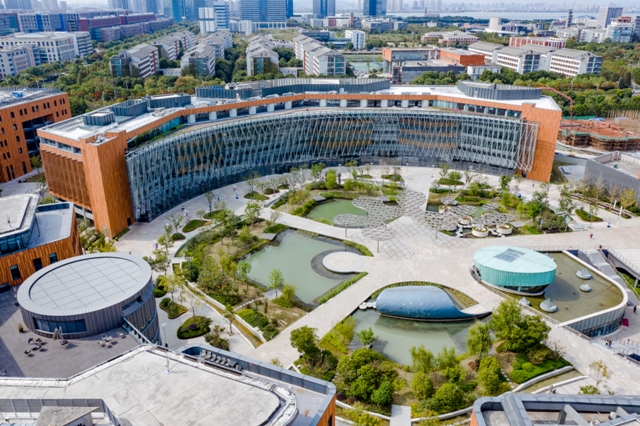Imagine being tied to one address for your entire life, and that leaving – even for a weekend – would mean fending for yourself in the wild, with no guaranteed access to food or shelter.
Draconian as it may sound, in the years following 1958, when China’s ‘internal passport’ system was formally introduced, the hukou worked in a similar fashion, providing certain entitlements for survival that were only accessible at one’s home base.
If you were born in the countryside, an agricultural hukou entitled you to a plot of land that you were expected to till for subsistence. If you were born into an urban household, the state set you up with a work unit or danwei, which provided you with a house, food, healthcare and education.
Everything revolved around the address stamped in your hukou book, including, in some sense, your identity.
“I think during the first decades of the communist era, the government really did have this attitude like it was going to take responsibility for all of the citizens of China, to make sure that they were fed and had welfare guarantees, and it was going to do this through the hukou system,” explains Joel Andreas, professor of sociology at Johns Hopkins University.

The hukou determines a number of important entitlements – such as where one can purchase a house or car, enroll children in school or gain medical coverage.
Today, the hukou functions quite differently. It still determines a number of important entitlements – such as where one can purchase a house or car, enroll children in school or gain medical coverage – but matters of food and employment are left to individuals. China’s planned economy, after all, has given way to a socialist market economy, and the hukou has adapted accordingly.
Nonetheless, it still plays a defining role in many people’s lives. Let’s say, for example, that your hukou is registered in Foshan but you relocate an hour’s drive away to Guangzhou and want to buy a car there. You’ll need to pay social insurance for at least two years before you’ll be eligible for new plates. That waiting period increases to three or more years if you’re looking to purchase a house, and without a hukou, you’ll only ever be able to buy one – not two – residences in the city.
Regardless of how much you earn, without a hukou, your kids will have trouble entering public schools in Guangzhou. Local hukou holders get first dibs.

Without a hukou, your kids will have trouble entering public schools in major cities.
And even if you manage to obtain a Guangzhou hukou that’s tied to an address in Tianhe District, there’s still no way your child can attend one of the more esteemed elementary schools in Yuexiu District, a 10-minute drive away. You’ll need to cough up an extra RMB4 million to buy a xueweifang – or a house that guarantees enrollment in a nearby school – before you can secure an education for your little one in Yuexiu.
“The hukou has a long history, but today it is really only used to protect populations in big cities”
“The hukou has a long history, but today it is really only used to protect populations in big cities,” says Hu Jiye, a professor of law and finance at China University of Political Sciences and Law in Beijing. “Schools and hospitals have a responsibility to uphold quality on behalf of local residents, but with so many people migrating to first-tier cities, these institutions are overrun.”
In the last 30 years, China has experienced the most extensive internal migration in the world, with 440 million people relocating from rural areas to urban centers between 1979 and 2009.
Statistics of migration to first-tier cities often focus on rural-urban migrants, but there is also a staggering number of young professionals who move between China’s large metropolises – the so-called ‘urban-urban’ migrants – for whom the hukou still presents immense inconveniences.

To control the scale of their populations, cities like Beijing, Shanghai and Guangzhou have introduced points systems to screen incoming hukou applicants.
Similar to the new grading system for expats in China, would-be migrants are scored on various categories, including their employment experience, field of work, academic credentials and even age. One can, for instance, earn 20 additional points just for being 45 or younger. A bachelor’s degree, by comparison, only garners 15 points.
READ MORE: Beijing Hukou Reform - Is It Enough?
In Beijing, hukou applicants are expected to have paid for medical insurance and pension plans in the city for seven consecutive years – the toughest requirement among all cities in China. The capital is also the first not to set a minimum number of points to qualify for a hukou, meaning applicants have no way of knowing how they measure up to the secret standard, which fluctuates every year.

Beijing has some of the toughest hukou requirements among all cities in China.
The points system is merely one in a series of reforms announced in 2014 that promised to “phase out” the hukou altogether – something Xi Jinping himself allegedly advocated years ago in his doctoral thesis while serving as governor of Fujian.
The most notable reform of 2014 was China’s decision to stop differentiating between urban and rural hukou for citizens living within city borders.
It dictated that those who held a rural hukou and lived on the outskirts of cities like Beijing or Shanghai would be reclassified as urban residents and offered an urban hukou.
READ MORE: Migrants to be Integrated into Guangzhou Communities

The most notable reform of 2014 was China’s decision to stop differentiating between urban and rural hukou for citizens living within city borders. But some say the reforms have done little to help.
Many local – and Western – media celebrated the policy, calling it a positive step towards bridging the decades-old gap between China’s rural and urban citizens. But experts like Kam Wing Chan, a professor of geography at the University of Washington, argue the 2014 reforms have done little to help.
“The nationwide abolition of the agricultural and non-agricultural hukou distinction does not mean much to the great majority of migrants because this change applies only to people within the same locales,” he says. “Migrants from other places are still classified as outsiders.”
READ MORE: 85 Percent of Migrants Feel They 'Don't Belong' in First-Tier Cities
For the few who did ‘benefit’ from the reforms, gaining access to an urban hukou also meant relinquishing their rural one, and, by extension, their land.
“The nationwide abolition of the agricultural and non-agricultural hukou distinction does not mean much... Migrants from other places are still classified as outsiders”
Professor Joel Andreas points out that the 2014 reforms have been particularly beneficial for municipalities, who, in the process of swapping urban hukou for rural citizens’ land, have acquired new acreage to use towards developing more profitable, large-scale commercial agriculture and luxury apartment complexes.
“That’s where these battles are taking place – where the cities are expanding into rural areas. That’s really where they’re pressing people to give up their land,” Andreas explains.
Whereas 20 years ago, many farmers would have happily exchanged their small plots for the higher wages and ‘face’ that accompanied an urban hukou, today, most prefer to stay where they are.

Similar to the new grading system for expats in China, would-be migrants are scored on various categories, including their employment experience, field of work, academic credentials and even age.
A 2014 survey by the Sichuan province bureau of statistics revealed that 90 percent of migrant workers do not want an urban hukou. One reason may be that current social welfare benefits, which used to make the urban hukou so attractive, have declined significantly since the 1980s.
Back in China’s metropolises, charting subtle shifts in the hukou system is less essential for the wealthy and younger generations, whose livelihood does not directly depend on the little maroon book.
“I guess an urban hukou is better than a rural one, though I don't really know the difference between the two,” admits Mia Long, a 24-year-old who recently moved to Shenzhen.
Still too young to worry about buying a house or where she’ll send her future kids to school, Long – like most in her generation – is free from the controlling grasp of the hukou. The distance makes it easier for some to see the humor in it all.
"So many entitlements, both urban and rural, are still based on the hukou"
“Mine still says I’m single,” grins Li Xiaojun, who recently celebrated his 11th wedding anniversary in Jilin province. “I bet 80 percent of Chinese people don’t even live at the same address listed in their hukou… it’s so out of touch.”
Outdated or not, experts claim the hukou is here to stay – at least for the foreseeable future.
“So many entitlements, both urban and rural, are still based on the hukou – it will be a long-term process to shift those,” concludes Andreas. “I think it [the hukou] will serve the purpose of keeping track of the population forever.”





















0 User Comments